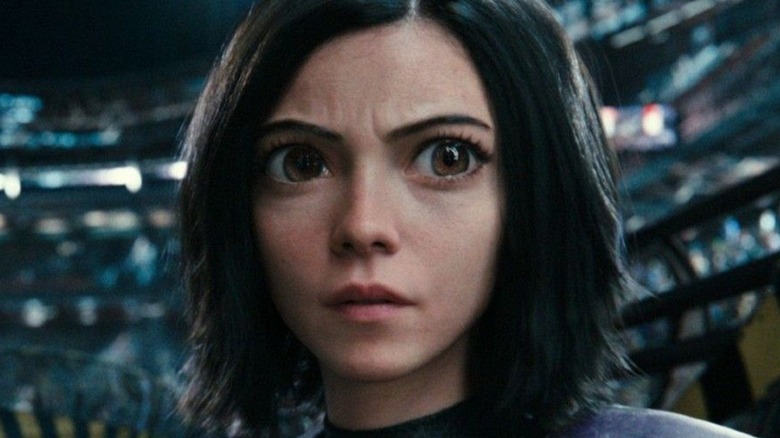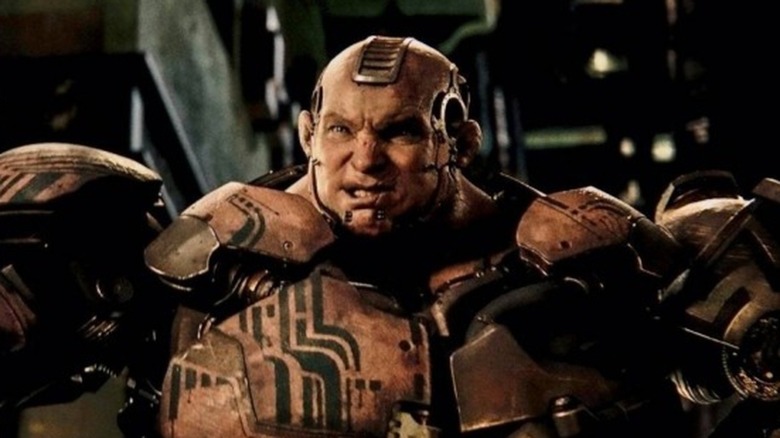This Character In Alita: Battle Angel Is Totally Different In The Manga
February 14, 2019, saw the arrival of the still sequel-less "Alita: Battle Angel" to the movies, a production that established itself in no time as a welcome addition to the science fiction genre. Led by Rosa Salazar, alongside names like Christoph Waltz, Ed Skrein, and Mahershala Ali, with Robert Rodriguez in the director's chair, the project had a strong backbone. Though it didn't necessarily make waves with audiences or become a box office smash, it isn't without its merits. Not only is it quickly becoming a cult classic, but it's viewed by most as a solid yet Hollywood-ized take on the source material.
In the early 1990s, famed manga artist Yukito Kishiro debuted "Gunm" or, as it's most commonly referred to, "Battle Angel Alita." It caught on in no time, becoming a major factor in the manga magazine "Business Jump" reaching record sales numbers throughout the first half of the decade. Readers fell more in love with the titular cyborg heroine and her many adventures with each passing installment, making her presence impossible to ignore in the live-action adaptation conversation. Though it took time, the fans eventually got their wish...to an extent.
The 2019 feature follows most of the same story beats as Kishiro's writings, but it took some creative liberties along the way for various reasons. Here's just one example of a secondary character who was changed drastically in translation from page to screen.
Grewishka bears little resemblance to his manga counterpart
One of Alita's biggest obstacles in "Alita: Battle Angel" is the villainous Grewishka (Jackie Earle Haley) — a hulking murder machine whose sole purpose is to serve his master, Nova (Edward Norton). Though he puts up a tough-as-nails front to intimidate his enemies, the truth is, Grewishka is a truly tragic character. He lacks any self-worth and views himself as garbage, thanks partially to Nova's treatment of him as nothing more than a weapon. This insecurity leads to his downfall in his third battle with Alita, after being humiliated by her in the first and getting a measure of revenge in the second.
When comparing Grewishka to the version found in "Battle Angel Alita," a few noteworthy differences begin to arise. First and foremost, the character's name is "Makaku" on the page, and he carries no permanent allegiance to Nova or Vector (Mahershala Ali). Also, Makaku's backstory is totally different, having been burned by a flamethrower and left for dead in the Scrapyard sewers by a group of bullies before Nova found him. Once in his cyborg form, he constantly sought opportunities to be noticed to escape the pain of his past, which Alita fed into by acknowledging and fighting him.
Despite these serious discrepancies, Grewishka and Makaku aren't total opposites, sharing a couple of similarities. They're both touted as having extraordinarily strong memory capabilities and have openly expressed the desire to defeat Alita and turn her into a pendant they can wear around their necks (via Sinfully Cinematic). Strangely enough, this is just about where the overlap ends, so why would the minds behind "Alita: Battle Angel" change a major character like Makaku so significantly?
The easiest explanation for the edits is that Makaku was simply too dark to translate into a PG-13 blockbuster. His thirst for human brains and depressing history wasn't exactly suitable for general audiences or children especially. Therefore, alterations were necessary, and the ultimate result was Grewishka: a cybernetic juggernaut with a serious inferiority complex.

